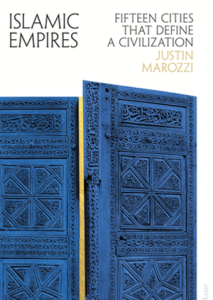Islamic Empires: Fifteen Cities That Define A Civilization

Author: Justin Marozzi
Publisher: Allen Lane
Year of Publication: 2019
Print Length: 512 pages
Genre: Non-Fiction / History, Social Science; Islamic Studies / History
Area: Ottoman Empire, North Africa, West Asia, Mediterranean, The Levant, Middle East, Mecca (Modern Saudi Arabia), Damascus (Modern Syria), Baghdad (Modern Iraq), South Europe, Cordoba (Modern Spain), Jerusalem (Modern Palestine), North Africa, Cairo (Modern Egypt), Fez (Modern Morocco), Central Asia, Samarkand (Modern Uzbekistan), Constantinople/Istanbul (Modern Turkey/Turkiye), Kabul (Modern Afghanistan), Isfahan (Modern Iran), Tripoli (Modern Libya) Beirut (Modern Lebanon), Dubai (Modern The United Arab Emirates (UAE)), Doha (Modern Qatar)
Topic: History, Islam, Muslim World, Muslim, Asylum, Prophet Muhammad ﷺ, Citizenship, City & Urban, Civilization, Community, Culture & Society, Governance, Nation-Building & Nationhood, The Abbasids, The Merinids, The Mughals, The Ottomans, The Safavids, The Umayyads, The Arabs
A history of the rich and diverse civilizations over fifteen centuries of Islam seen through its greatest cities.
Islamic civilization was once the envy of the world. From a succession of glittering, cosmopolitan capitals, Islamic empires lorded it over the Middle East, North Africa, Central Asia and swathes of the Indian subcontinent, while Europe cowered feebly at the margins. For centuries the caliphate was both ascendant on the battlefield and triumphant in the battle of ideas, its cities unrivalled powerhouses of artistic grandeur, commercial power, spiritual sanctity and forward-looking thinking, in which nothing was off limits.
Islamic Empires is a history of this rich and diverse civilization told through its greatest cities over the fifteen centuries of Islam, from its earliest beginnings in Mecca in the seventh century to the astonishing rise of Doha in the twenty-first.
It dwells on the most remarkable dynasties ever to lead the Muslim world – the Abbasids of Baghdad, the Umayyads of Damascus and Cordoba, the Merinids of Fez, the Ottomans of Istanbul, the Mughals of India and the Safavids of Isfahan – and some of the most charismatic leaders in Muslim history, from Saladin in Cairo and mighty Tamerlane of Samarkand to the poet-prince Babur in his mountain kingdom of Kabul and the irrepressible Maktoum dynasty of Dubai. It focuses on these fifteen cities at some of the defining moments in Islamic history: from the Prophet Mohammed receiving his divine revelations in Mecca and the First Crusade of 1099 to the conquest of Constantinople in 1453 and the phenomenal creation of the merchant republic of Beirut in the nineteenth century.
Table of Contents
List of Illustrations
List of Maps
A Note on Spelling
Preface
1. 7th Century: Mecca – Mother of All Cities
2. 8th Century: Damascus – The Perfumed Paradise
3. 9th Century: Baghdad – City of Peace, City of Blood
4. 10th Century: Cordoba – Ornament of the World
5. 11th Century: Jerusalem – The Contested City
6. 12th Century: Cairo – The City Victorious
7. 13th Century: Fez – The Athens of Africa
8. 14th Century: Samarkand – Garden of the Soul
9. 15th Century: Constantinople – City of the World’s Desire
10. 16th Century: Kabul – A Garden in the Mountains
11. 17th Century: Isfahan – Half of the World
12. 18th Century: Tripoli – Pirates’ Lair
13. 19th Century: Beirut – Playground of the Levant
14. 20th Century: Dubai – Build It and They Will Come
15. 21th Century: Doha – City of Pearls
Notes
Bibliography
Acknowledgments
Index

Justin Marozzi is a travel writer, historian, journalist and communications expert. He recently spent more than a year living in Mogadishu as communications advisor to the President and Prime Minister of Somalia. He has travelled extensively in the Middle East and Muslim world and has worked in conflict and post-conflict environments such as Iraq, Libya, Afghanistan, Somalia and Darfur. He graduated from Cambridge with a Starred Double First in History in 1993, before studying Broadcast Journalism at Cardiff University and winning a scholarship to the University of Pennsylvania to read a Masters in International Relations. After working in the BBC World Service on ‘News Hour’ and BBC Westminster on ‘Today in Parliament’, he joined the Financial Times as a foreign correspondent in Manila, where he also wrote for The Economist.
Source: https://www.justinmarozzi.com/about/
More from Justin Marozzi in this library, click here.
